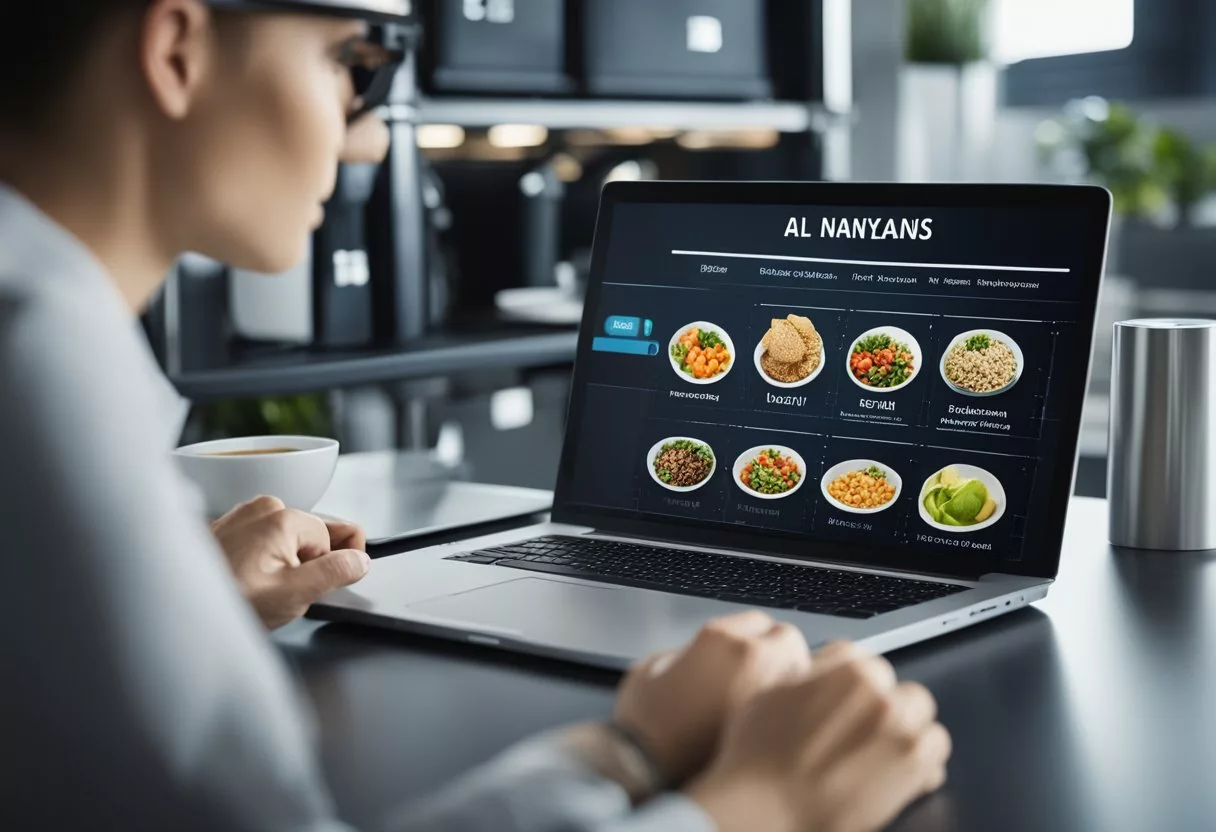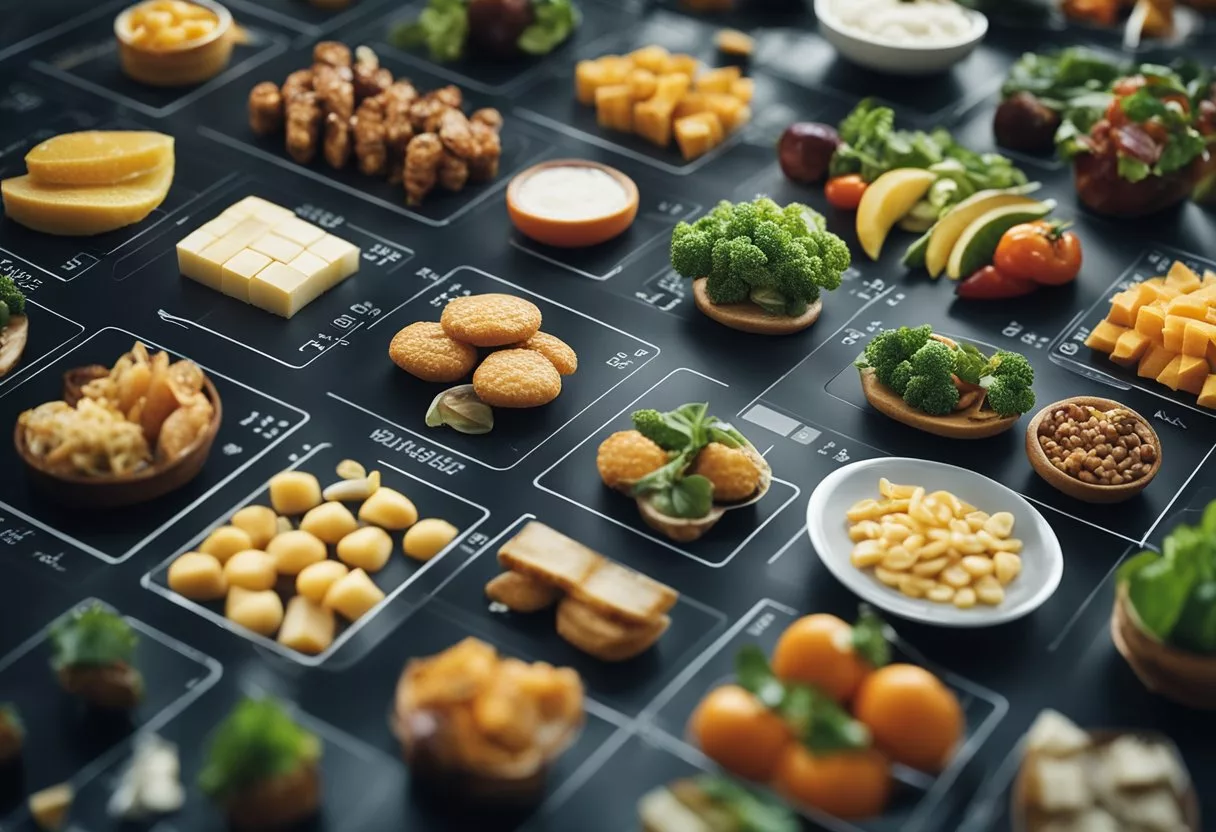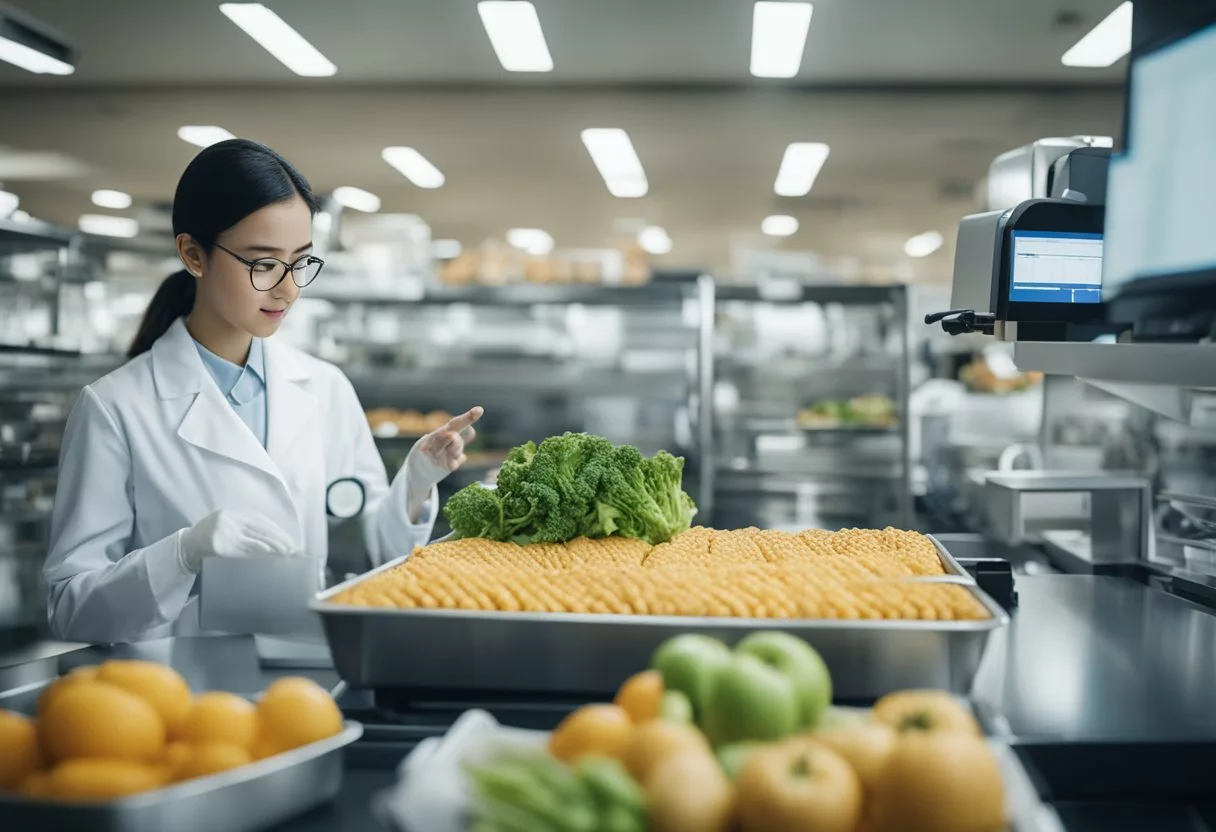Artificial intelligence (AI) is set to change the way we approach nutrition and health. It will offer personalized dietary advice tailored to individual needs. By using AI, healthcare providers and nutritionists can create customized eating plans. AI can consider a myriad of factors such as genetic profile, lifestyle, health condition, and preferences.
The precision of AI-driven analysis promises to enhance the effectiveness of dietary recommendations. This makes them more applicable and actionable for the individual.

Personalized diets have emerged from the understanding that a one-size-fits-all approach to nutrition is insufficient. AI can sift through extensive datasets to identify patterns and predict outcomes. This leads to dietary plans that potentially improve user health and well-being.
The integration of AI in this field is a major step toward precision health. However, this integration also poses challenges, such as data privacy concerns and the need for robust algorithms that can accurately interpret complex health data.
Key Takeaways
- AI’s integration into nutrition marks a significant shift towards highly personalized diet plans.
- Personalized diets, developed using AI, cater to individual health needs and lifestyles.
- Challenges such as data privacy and the complexity of health data interpretation remain.
Artificial Intelligence and Personalized Diets

Personalized diets are rapidly evolving as the intersection of individual genetics and health conditions tailor dietary recommendations. They aim to optimize nutritional intake based on unique physiological profiles, leading to better health outcomes.
The Role of Genetics in Nutrition
Genetics play a pivotal role in nutrigenomics, the study of the relationship between genes and nutrition. Nutrigenomics examines how genetic makeup influences an individual’s response to certain foods, potentially leading to nutritional deficiencies or enhanced well-being.
For example, variations in the MTHFR gene can affect folate metabolism. This makes personalized folate recommendations crucial.
Assessing Health Conditions and Dietary Restrictions
Individual health conditions and dietary restrictions are fundamental to developing personalized diet plans. Healthcare professionals assess medical history, current health conditions, such as diabetes or heart disease, and dietary restrictions. This assessment helps in preventing nutritional deficiencies and promoting a diet that supports the management of specific health conditions.
Analyzing Dietary Habits and Preferences
The analysis of dietary habits and preferences is a cornerstone of personalized nutrition. It involves tracking eating patterns and food choices to create a diet that aligns with personal preferences and health goals.
Continuous monitoring through apps or devices can aid in understanding an individual’s patterns and making more precise dietary recommendations.
Role of AI in Personalized Diet Development

The integration of artificial intelligence (AI) in nutrition heralds a new era of bespoke dietary guidance. It merges vast data analysis with individualized meal planning to optimize health outcomes.
Machine Learning for Nutritional Data Analysis
AI’s capability to sift through immense nutritional databases allows for the identification of patterns and correlations between dietary intake and health markers. Researchers employ machine learning algorithms to analyze complex nutrient profiles and eating habits, yielding insights that are critical for customizing diets.
This sophisticated form of data analysis is fundamental in recognizing the unique dietary needs of individuals. It takes into account not only macronutrients but also micronutrient intake and dietary restrictions.
Predictive Models for Diet Optimization
Through the construction of predictive models, AI forecasts the potential impacts of dietary adjustments on an individual’s health. These models can simulate outcomes based on specific nutritional changes, guiding the development of personalized diets that align with each individual’s health goals and conditions.
Such technology pushes the boundaries of nutrition science, enabling precision in recommending diets tailored to optimize well-being and manage conditions like diabetes or heart disease.
AI-Driven Personalized Meal Planning
Personalized meal plans are the direct application of AI-driven analysis. Algorithms generate meal suggestions that align with personal health data, preferences, and goals.
These plans consider an array of factors, including dietary restrictions and technological advancements, to deliver actionable and sustainable eating strategies. They represent a leap forward from one-size-fits-all dietary advice, offering a level of customization that was previously unattainable.
Impact of AI on Dietary Health

The intersection of AI and dietary health promises to revolutionize the way individuals manage their well-being. Advanced algorithms and machine learning tools are paving the way for personalized diets to prevent and manage chronic diseases, control obesity, and enhance overall nutritional health.
Preventing and Managing Chronic Diseases
AI has a substantial role in personalized nutrition, which is critical in the prevention and management of chronic diseases. By analyzing large datasets, AI can identify patterns and offer customized dietary recommendations that may help prevent conditions such as type 2 diabetes and heart disease.
For instance, AI-driven programs are capable of suggesting specific dietary changes that can improve blood sugar levels and reduce the risk of diabetes complications.
Weight Loss and Obesity Control
Obesity is a growing concern in public health, contributing to various health conditions. AI’s ability to tailor nutrition plans based on individual’s health data contributes to effective weight loss strategies.
By leveraging personal health records and dietary preferences, AI helps create diet plans that not only aim to reduce body weight but also adapt to changes in body composition and metabolic rates.
Enhancing Nutritional Well-Being
Beyond disease management and weight control, AI enhances overall nutritional well-being by providing individuals with tailored advice on nutrient intake. This application of AI in healthcare is instrumental in designing personalized diets that ensure adequate intake of all essential nutrients based on individual requirements.
Consequently, this promotes healthier eating habits and a more balanced approach to nutrition.
Personalization Factors and AI

Artificial intelligence is redefining personalized nutrition by leveraging factors such as individual genetics, microbiome composition, and lifestyle variables to tailor diets.
Tailoring Diets to Individual Genetics
A crucial component of diet personalization involves aligning nutritional plans with an individual’s genetic makeup. AI-driven algorithms can analyze genetic information to predict how someone might react to certain foods.
For example, certain genetic variations can affect nutrient metabolism, allowing AI to recommend diets optimized for better genetic compatibility.
Microbiome and Personal Diets
The role of the microbiome in personal health is becoming clearer with advancements in microbiome data analysis. AI tools can now interpret this data to understand how the gut health of individuals might influence their reactions to certain diets and suggest adjustments for optimal microbiome balance.
Lifestyle Considerations in AI-Personalized Eating
Lifestyle factors, including physical activity, age, and eating preferences, all feed into the AI’s algorithms for crafting personal diets.
An active lifestyle, for instance, calls for a different energy intake than a sedentary one. AI systems integrate these considerations to propose a personalized diet that matches the individual’s daily energy expenditure and food likes and dislikes, suggesting a balanced, enjoyable eating plan.
Integrating AI in Public Health Nutrition

Artificial intelligence (AI) is becoming a revolutionary force in public health nutrition by enabling the customization of diets at scale and informing policy decisions with precision.
Scaling Personalized Diets for Wider Populations
AI facilitates the analysis of large datasets, allowing for the identification of dietary patterns aligned with nutrigenetics and regional health needs.
By cross-referencing individual genetic profiles with nutritional requirements, AI can optimize diet plans for diverse groups within the public health system. With AI, healthcare providers can extend personalized nutrition to entire populations, utilizing limited resources more efficiently.
Digital Health and Nutritional Education
In the realm of digital health, AI-powered applications are leading the transformation of nutritional education. They process user-input data to provide tailored advice and education, thereby fostering informed dietary choices.
These platforms can extend their reach to participants in remote areas, bridging the gap in access to nutritional expertise across different socio-economic groups.
AI and Nutritional Policy Making
With deeper insights provided by AI-driven nutrition science studies, policymakers can craft evidence-based nutrition guidelines.
AI systems analyze patterns from a wealth of health data to suggest interventions that target public health issues more accurately.
They support the allocation of healthcare resources to where they are needed most, ultimately aiding in the creation of more effective nutrition policies.
Each of these areas demonstrates AI’s potential to transform how public health approaches nutrition, from personal diets to larger-scale policies, ensuring the benefits are felt across society.
Technological and Scientific Advances

The fusion of technology and science promises to revolutionize the way personalized diets are crafted and followed.
With cutting-edge innovations in genetic testing, wearable technology, and AI-driven research, the landscape of personalized nutrition is rapidly changing to become more precise and effective.
Genetic Testing and Nutrigenetics
Genetic testing is at the forefront of personalizing diet plans.
By examining individual DNA variations, genetic testing unveils insights into how bodies metabolize nutrients, thereby tailoring diets that align with one’s unique genetic makeup.
Nutrigenetics, a science that combines genetics with nutrition, focuses on understanding the relationship between genes, diet, and health outcomes.
By interpreting biomarkers through genetic tests, personalized nutrition plans can be devised that effectively prevent and manage disease.
Wearable Technology for Diet Tracking
Wearable technology has evolved beyond simple step counters.
Today’s devices monitor an array of health metrics like heart rate, sleep quality, and even stress levels.
This wearable technology provides real-time data which can correlate dietary inputs with physiological changes, thus shaping personalized dietary recommendations.
The integration of these devices with nutritional apps leverages technology to give users the power to track and optimize their diet and health.
Deep Learning in Nutritional Research
Deep learning, a subset of artificial intelligence (AI), is driving advancements in nutritional science.
Through pattern recognition and predictive analytics, deep learning algorithms analyze vast datasets — from epigenetic markers to social eating habits.
The technology then elucidates complex nutritional needs and adapts dietary suggestions accordingly.
Researchers are using deep learning to explore the effects of diet on epigenetics, further personalizing nutrition based on how diet can influence gene expression over time.
Challenges and Future Directions

The rise of AI in crafting personalized diets presents both significant promises and challenges. Key among them are ethical considerations regarding data privacy, the need to improve accessibility, and the future prospects of AI in personalized nutrition, which requires a careful and informed approach to maximize benefits and minimize risks.
Ethical Considerations and Data Privacy
Developing personalized diets through artificial intelligence demands rigorous ethical standards and robust data privacy measures.
The collection and analysis of sensitive personal health data pose risks that must be managed.
AI systems must ensure the confidentiality and integrity of user data while providing accurate dietary recommendations.
Researchers point to the necessity for more stringent research on these parameters to safeguard against breaches and misuse.
Improving the Accessibility of Personalized Diets
The accessibility of AI-powered personalized diets is another pivotal challenge.
Although these diets can be highly effective, they currently may not be universally available due to high costs or technical requirements.
Strategies to reduce barriers and make personalized nutrition accessible to a wider audience are crucial, particularly for vulnerable populations who could benefit greatly from such interventions.
Future Prospects of AI and Personalized Nutrition
The future of AI in personalized nutrition is poised for growth, driven by advances in metabolomics and AI-driven analysis.
This promises not only more effective and personalized dietary recommendations but also holistic health profiles tailored to the individual’s unique physiological makeup.
The integration of lifestyle data with dietary habits is set to transform personalized diet planning, making it not only more responsive but also truly customized to individual health goals and needs.
Practical Application and Daily Integration

Artificial Intelligence (AI) is becoming a game-changer for individual health and wellness by enabling practical, tailored dietary programs that can be integrated seamlessly into day-to-day life.
These AI-driven systems are designed to accommodate personal health goals, dietary preferences, and unique nutritional needs, bringing a higher level of customization to meal planning and preparation.
Implementing Personalized Diets at Home
Implementing a customized approach to diets at home has been simplified with AI’s ability to analyze patterns in an individual’s eating habits and nutritional intake.
One can now receive personalized dietary advice that takes into account not only their health and wellness goals but also food sensitivities and allergens.
For instance, AI can curate daily meal plans and provide recipe suggestions tailored to an individual’s caloric needs and dietary restrictions such as gluten intolerance or lactose sensitivity.
AI-Supported Grocery Shopping and Cooking
When it comes to grocery shopping, AI brings an added layer of convenience and personalization.
It can generate shopping lists that reflect both the nutritional needs and preferences of an individual, making grocery shopping more efficient.
Moreover, some AI applications are now capable of working with online grocery services to ensure that the right ingredients are delivered to the user’s doorstep.
In cooking, AI-assisted apps can guide individuals through recipes that fit their personalized diet plans, considering any necessary supplements to enhance their nutritional value.
Aligning Personalized Diets with Real-Life Constraints
Personalized diets are more sustainable when they align with real-life constraints such as budget, time, and food safety considerations.
AI tools support this by adjusting meal plans based on an individual’s schedule and financial limits, and by providing suggestions for meal prepping in advance.
These tools also stay updated with the latest food safety advisories to ensure individuals are not only eating what is right for them but also what is safe.
The technology accommodates changes in diet and lifestyle, ensuring the personalized diet remains relevant and actionable over time.
Frequently Asked Questions

Artificial intelligence stands to transform how personalized diets are constructed and adhered to by individuals, harnessing data to optimize nutrition on a person-to-person basis.
How can AI technology contribute to the creation of personalized diet plans?
AI technology can analyze vast amounts of data including an individual’s health records, dietary preferences, and lifestyle choices.
It can then utilize machine learning algorithms to create highly customized diet plans tailored to a person’s specific needs and goals.
What are the potential benefits of using AI in individual nutritional guidance?
The use of AI in nutritional guidance can offer personalized advice that adjusts over time, taking into account real-time feedback from the individual.
This could lead to more efficient diet modifications and potentially better health outcomes.
Can AI-based apps improve adherence to personalized diet recommendations?
AI-based apps can send reminders and adjustments to a user’s diet plan based on their progress and any new data.
By providing real-time, context-aware suggestions, these apps can enhance a person’s ability to stick with their personalized diet.
How do AI-powered nutritionist platforms customize dietary advice for users?
AI-powered nutritionist platforms typically gather user data such as body metrics, eating habits, and fitness levels to craft individualized advice.
They employ machine learning to constantly refine and personalize dietary suggestions as more data becomes available.
What role does AI play in understanding nutritional needs and food intolerances?
AI assists in identifying nutritional needs and food intolerances by analyzing patterns in dietary habits and physical reactions after eating specific foods.
This can enable the creation of diets that avoid allergens and cater to specific nutritional deficiencies.
In what ways might AI enhance the accuracy of personalized dietary interventions?
AI can improve the accuracy of dietary interventions. It does this by continuously learning from diverse datasets and clinical research. This ensures that dietary recommendations are based on the most current scientific knowledge and the individual’s evolving health status.